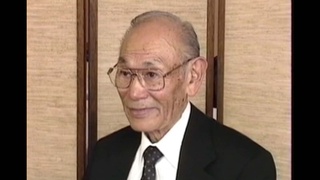Interviews
Finding the Smoking Gun
And I picked out the box that said Korematsu v. United States. And I thought I would start with that one. It wasn't the first case, but I picked a file, and the box was full of manila folders. And I picked a file, just the first one on the top of the box, and opened it up. And there was a memo -- this was literally the first page I looked at of all these records, the first file. It may have been the second or third, but almost in the first five minutes that I was looking at these records, I found a memo. And it was written by a government Justice Department lawyer named Edward Ennis. And it was written to the solicitor general of the United States, Charles Fahy at that time. I knew their names already from WRA records that I'd looked at earlier, that Aiko and I had gone through from the WRA.
And in that memo, which was a memo to the solicitor general who was preparing to argue the Korematsu case before the Supreme Court in 1944, Ennis said, "We are in possession of information that shows that the War Department's report on the internment is a lie. And we have an ethical obligation not to tell a lie to the Supreme Court, and we must decide whether to correct that record."
And looking at that document, I still remember vividly thinking, "Oh, my God. This is amazing. This is like a smoking gun." Here's a lawyer for the government about to be, in a case about to be argued before the Supreme Court saying, "We are telling lies to the Supreme Court." And if I had only been a historian, I probably would have said, "Well, this is very interesting." Add something to my book. But as a lawyer, I realized this is, and in fact, the memo said, "This may approximate the suppression of evidence." As a lawyer, I realized this is dynamite.
Date: October 27, 2000
Location: Washington, US
Interviewer: Alice Ito, Lorraine Bannai
Contributed by: Denshō: The Japanese American Legacy Project.
Explore More Videos

Role of the redress movement in helping Nisei to open up about their wartime experiences
(b. 1946) Lawyer

Memories of hearing the verdict in Fred Korematsu's coram nobis case
(b. 1946) Lawyer

Impact of the Korematsu coram nobis case, historically and personally
(b. 1946) Lawyer



The political effects on Nikkei during the war (Spanish)
(b. 1950) Nisei Chilean, Businessman

Prevailing Within the System
(1923–2006) Community activist. Co-founded the Manzanar Committee

The Final Verdict
(1919 - 2005) Challenged the constitutionality of Executive Order 9066.

A Wrong Righted
(1919 - 2005) Challenged the constitutionality of Executive Order 9066.


Duties of the Witness Chair
Chaired the Chicago JACL's Redress Committee.


Inouye’s strategy for educating the American public
(1917 - 2004) Political activist

Redress clash between Senators Inouye and Hayakawa
(1917 - 2004) Political activist

The unheralded help from beyond the community
(1917 - 2004) Political activist
